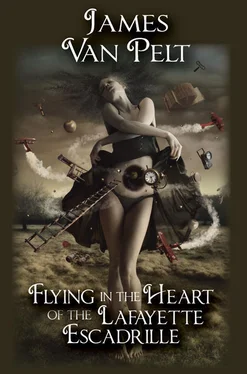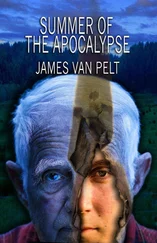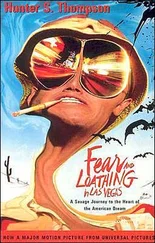James Van Pelt
FLYING IN THE HEART OF THE LAFAYETTE ESCADRILLE

To Ed Low, Bonnie Slack, Mrs. Smith, and every hardworking English teacher who loves literature, writing, and students equally.
INTRODUCTION
by Brenda Cooper
Some of us in the Northwest are lucky. Once every year, James Van Pelt comes to the Rainforest Writer’s Village, and we get to hear him teach. He is an educator by trade, and good at it. If we’re extra lucky, we join him on a walk through the amazing Cascade rainforest, with its cedar overstory and fern and water and moss understory. Sometimes we sit huddled together by a blazing hot fireplace insert in a bar that the entire group of us takes over for the cold, rainy days, and we write fiction while he writes fiction.
This is the context in which I first met James. He is one of our best writers. He mostly does short fiction, so what you are holding in your hand is some of the best current science fiction and fantasy available. Really. You don’t have to believe me. Just go visit his webpage and peruse his bibliography and notice how many of his short stories ended up in Year’s Best anthologies of one kind or another, or gained honorable mentions in them.
The thing I love the most about Jim’s writing is that it’s smart. The stories are true to their speculative roots, redolent with wonder, but they’ve also been touched by the literary brush. They contain well-crafted sentences and well-placed commas, solid workable structure, and confident prose.
The thing I love the next-most about Jim’s writing is that it’s varied. In this collection you’ll find a wide array of characters in different situations, times, and settings and with different problems. After reading at least forty or fifty of his stories, I’m pretty confident that Jim can pull off anything. I happen to know he has now sold over a hundred stories, and I’m sure they are very different one from another. This particular collection shows more of Jim’s range than any of his others; I was regularly surprised by the stories as I read through them.
When Jim asked me to write this introduction, I said “yes” in spite of the fact that there was no way I had time to read it all. But it felt like an honor to be asked. I had read all of his last collection, The Radio Magician and Other Stories , and provided a blurb for it. So I could do this. I would simply read a few of these stories, comment on those, and it would all be well.
I should have known better.
Despite my lack of time, I read the whole damned thing. Jim’s just that good a writer. Here are a few of my favorites:
The title story, “Flying in the Heart of the Lafayette Escadrille,” is just magic. From the opening paragraph, I’m there with Jim’s character.
“Just Before Recess” is short and magical and strange. Good strange. I’m going to give you the opening line, just so you don’t miss this little gem. “Parker kept a sun in his desk.” Wow. Don’t you just have to go read that?
“Night Sweats” is the most subtle ghost story I have ever read.
My favorite story in the whole collection is “Howl Above the Din.” It’s incredibly bitter-sweet and evocative, and the tiniest bit sexy.
Closely in second place, this collection also includes the quirky commentary on the human heart called “Plant Life.”
I shall stop now. I could say something nice about every story in this book. But I think I should get out of the way so that you can start reading. Enjoy!
FLYING IN THE HEART OF THE LAFAYETTE ESCADRILLE
At 14,000 feet the November air rushes from the prop and buffets my head. Even with goggles, a thick, fur-lined leather cap and a layer of protective grease on my face, I am freezing. My cheeks tingle, my hands ache, and my knees crack with stiffness. My elbows clamp my ribs to hold in a little warmth as I admire the rising sun’s broad, lovely light shafts through the clouds and the long shadows across the Verdun sector’s snow-covered fields. I don’t mind the cold. Everything is white or purple except my brown and tan pursuit ship and my black twin Vickers machine guns.
The 110 horse power Le Rhone engine’s roar deafens me but is so steady that I have to concentrate to hear it. I fly, then, in a kind of silence. The clean air, the sun-bathed countryside, the two toned clouds cut into irregular halves of light and dark, and the Nieuport 17, an old and reliable partner now of three months, are my only company. I fly solo. Dawn patrol. I hunt an enemy, a specific ship, a blue and silver Fokker D-2 with a red cowling.
The plane responds to my thoughts. I think left and the horizon tilts; I scan the air below. At this height I am unlikely to be surprised from above. The Boche send flights from Colmar and Habsheim, but they fly lower, relying on the cover of archie from the ground to protect them, and they seldom cross the lines.
A stream glints like a mirrored ribbon and cuts a diagonal through the trenches. An infantryman could put a note in a bottle and float it to the other line. Maybe he could write about his family back home, or invite whoever reads it to share a drink with him, if whoever picks it up could read it that is, if he could understand the language.
I think right and the world rotates for me. Three two-seaters several thousand feet lower than I fly south, but they are British observers, their wings’ bull’s-eye insignias obvious. I don’t believe they know I pass above them. They must be young. At twenty-nine, I am not. I lied about my age to the French, although they might have let me fly anyway—they want the American volunteers to fight for them. They even brought us together into one unit and called us the Americaine Escadrille, but the Heinies complained—America is neutral—and now we are the Lafayette Escadrille. They’ve told us to say, viv le France. God bless America, and to hell with the Hun!
“I love this place, Eddie. Don’t you? You got to love this place,” Brian, the bar-ace, yelled over the rock-and-roll din of the Lafayette Escadrille Bar and Grill. “Look at that,” he said as a waitress walked by in a French maid’s uniform, beer pitcher and three mugs in one hand, black fish-net stockings emphasizing the curve of her calves and the aerobicized tone of her thighs. “Makes me want to roll around in the dirt.”
“Yeah, she’s okay,” I said. I balanced the stool on two legs and rested my back on the sandbag wall. The blue runway lights of Stapleton International Airport backlit the filled dance floor. A 737, its jets cranked for take-off, rushed by and rattled the heavy, insulated glass. Even through the music, the engines pushed a subsonic vibration into the bar. Glasses and change buzzed for a second on dark oak table tops.
The Lafayette Escadrille opened a year ago when a group of Denver stock-brokers pooled their money and invested in a “high concept” singles joint; they turned a barn on the edge of the north-south runway into a World War I French chalet. In front of the building, pointing skyward at a ridiculously phallic angle, are a pair of anti-aircraft guns; on the wall inside the door hang black and white photos: a fuzzy shot of Kaiser Wilhelm II visiting an airdrome; a crowd of officers standing around the wreckage of Max Immelmann’s plane; George Guynemer, France’s leading ace, facing the camera with his hands behind his back; Baron Manfred von Richthofen standing for inspection with the pilots of Jagdgeschwader No. 2. I’ve stood in the foyer and studied these pictures when the noise and smoke and disgust have driven me out of the bar. I’ve looked at their gray and grainy faces for some clue as to what they felt when they climbed in their planes. How could they go up every day? No parachutes. No early warning radar. No way to talk to each other.
Читать дальше











